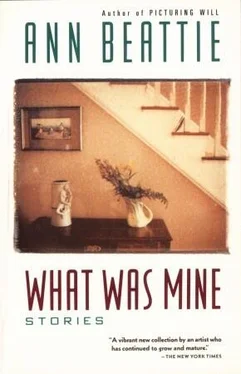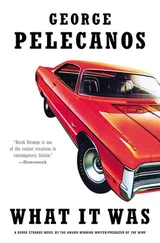Ann Beattie - What Was Mine
Здесь есть возможность читать онлайн «Ann Beattie - What Was Mine» весь текст электронной книги совершенно бесплатно (целиком полную версию без сокращений). В некоторых случаях можно слушать аудио, скачать через торрент в формате fb2 и присутствует краткое содержание. Год выпуска: 1992, Издательство: Vintage, Жанр: Современная проза, на английском языке. Описание произведения, (предисловие) а так же отзывы посетителей доступны на портале библиотеки ЛибКат.
- Название:What Was Mine
- Автор:
- Издательство:Vintage
- Жанр:
- Год:1992
- ISBN:нет данных
- Рейтинг книги:5 / 5. Голосов: 1
-
Избранное:Добавить в избранное
- Отзывы:
-
Ваша оценка:
- 100
- 1
- 2
- 3
- 4
- 5
What Was Mine: краткое содержание, описание и аннотация
Предлагаем к чтению аннотацию, описание, краткое содержание или предисловие (зависит от того, что написал сам автор книги «What Was Mine»). Если вы не нашли необходимую информацию о книге — напишите в комментариях, мы постараемся отыскать её.
What Was Mine — читать онлайн бесплатно полную книгу (весь текст) целиком
Ниже представлен текст книги, разбитый по страницам. Система сохранения места последней прочитанной страницы, позволяет с удобством читать онлайн бесплатно книгу «What Was Mine», без необходимости каждый раз заново искать на чём Вы остановились. Поставьте закладку, и сможете в любой момент перейти на страницу, на которой закончили чтение.
Интервал:
Закладка:
One of the most distinct memories of my early years is of that night I opened my mother’s door and saw Herb lose his balance and fall forward on the bouquet like a thief clutching bread under his shirt.
“Ethan,” my mother said, “I don’t know what you are doing in here at a time when you are supposed to be in bed — and without the manners to knock — but I think the time has come to tell you that Herbert and I are very close, but not close in the way family members such as a brother and sister are. Herbert is not your uncle, but you must go on as if he were. Other people should not know this.”
Herb had rolled onto his side. As he listened, he began laughing. He threw the crushed bouquet free, and I caught it by taking one step forward and waiting for it to land in my outstretched hand. It was the way Herb had taught me to catch a ball, because I had a tendency to overreact and rush too far forward, too fast. By the time I had caught the bouquet, exactly what my mother said had become a blur: manners, Herbert, not family, don’t say anything.
Herb rolled off the bed, stood, and pulled on his pants. I had the clear impression that he was in worse trouble than I was. I think that what he said to me was that his affection for me was just what it always had been, even though he wasn’t actually my uncle. I know that my mother threw a pillow at him and told him not to confuse me. Then she looked at me and said, emphatically, that Herb was not a part of our family. After saying that, she became quite flustered and got up and stomped out of the bedroom, slamming the door behind her. Herb gave the door a dismissive wave of the hand. Alone with him, I felt much better. I suppose I had thought that he might vanish — if he was not my uncle, he might suddenly disappear — so that his continued presence was very reassuring.
“Don’t worry about it,” he said. “The divorce rate is climbing, people are itching to change jobs every five minutes. You wait: Dwight Eisenhower is going to be reevaluated. He won’t have the same position in history that he has today.” He looked at me. He sat on the side of the bed. “I’m your mother’s boyfriend,” he said. “She doesn’t want to marry me. It doesn’t matter. I’m not going anywhere. Just keep it between us that I’m not Uncle Herb.”
My mother was tall and blond, the oldest child of a German family that had immigrated to America in the 1920s. Herb was dark-haired, the only child of a Lebanese father and his much younger English bride, who had considered even on the eve of her wedding leaving the Church of England to convert to Catholicism and become a nun. In retrospect, I realize that my mother’s shyness about her height and her having been indoctrinated to believe that the hope of the future lay in her accomplishing great things, and Herb’s self-consciousness about his kinky hair, along with his attempt as a child to negotiate peace between his mother and father, resulted in an odd bond between Herb and my mother: she was drawn to his conciliatory nature, and he was drawn to her no-nonsense attitude. Or perhaps she was drawn to his unusual amber eyes, and he was taken in by her inadvertently sexy, self-conscious girlishness. Maybe he took great pleasure in shocking her, in playing to her secret, more sophisticated desires, and she was secretly amused and gratified that he took it as a given that she was highly competent and did not have to prove herself to him in any way whatsoever.
She worked in a bank. He worked in the automotive section at Sears, Roebuck, and on the weekend he played piano, harmonica, and sometimes tenor sax at a bar off Pennsylvania Avenue called the Merry Mariner. On Saturday nights my mother and I would sit side by side, dressed in our good clothes, in a booth upholstered in blue Naugahyde, behind which dangled nets that were nailed to the wall, studded with starfish, conch shells, sea horses, and clamshells with small painted scenes or decals inside them. I would have to turn sideways and look above my mother to see them. I had to work out a way of seeming to be looking in front of me and listening appreciatively to Uncle Herb while at the very same time rolling my eyes upward to take in those tiny depictions of sunsets, rainbows, and ships sailing through the moonlight. Uncle Herb played a slowish version of “Let Me Call You Sweetheart” on the harmonica as I sipped my cherry Coke with real cherries in it: three, because the waitress liked me. He played “As Time Goes By” on the piano, singing so quietly it seemed he was humming. My mother and I always split the fisherman’s platter: four shrimp, one crab cake, and a lobster tail, or sometimes two if the owner wasn’t in the kitchen, though my mother often wrapped up the lobster tails and saved them for our Sunday dinner. She would slice them and dish them up over rice, along with the tomato-and-lettuce salad she served almost every night.
Some of Uncle Herb’s songs would go out to couples celebrating an anniversary, or to birthday boys, or to women being courted by men who preferred to let Uncle Herb sing the romantic thoughts they hesitated to speak. Once during the evening Herb would dedicate a song to my mother, always referring to her as “my own special someone” and nodding — but never looking directly — toward our booth.
My mother kept the beat to faster tunes by tapping her fingers on the shiny varnished tabletop. During the slow numbers she would slide one finger back and forth against the edge of the table, moving her hand so delicately she might have been testing the blade of a knife. Above her blond curls I would see miniature versions of what I thought must be the most exotic places on earth — so exotic that any small reference to them would quicken the heart of anyone familiar with the mountains of Hawaii or the seas of Bora-Bora. My mother smoked cigarettes, so that sometimes I would see these places through fog. When the overhead lights were turned from blue to pink as Uncle Herb played the last set, they would be transformed to the most ideal possible versions of paradise. I was hypnotized by what seemed to me their romantic clarity, as Herb sang a bemused version of “Stormy Weather,” then picked up the saxophone for “Green Eyes,” and finished, always, with a Billie Holiday song he would play very simply on the piano, without singing. Then the lights went to a dusky red and gradually brightened to a golden light that seemed as stupefying to me as the cloud rising at Los Alamos must have seemed to the observers of Trinity. It allowed people enough light to judge their sobriety, pay the bill, or decide to postpone functioning until later and vanish into the darker reaches of the bar at the back. Uncle Herb never patted me on the shoulder or tousled my cowlick. He usually sank down next to my mother — still bowing slightly to acknowledge the applause — then reached over with the same automatic motion my mother used when she withdrew a cigarette from the pack to run his thumb quickly over my knuckles, as if he were testing a keyboard. If a thunderbolt had left his fingertips, it could not have been more clear: he wanted me to be a piano player.
That plan had to be abandoned when I was thirteen. Or perhaps it did not really have to be abandoned, but at the time I found a convenient excuse to let go of the idea. One day, as my mother rounded a curve in the rain, the car skidded into a telephone pole. As the windshield splattered into cubes of glass, my wrist was broken and my shoulder dislocated. My mother was not hurt at all, though when she called Herb at work she became so hysterical that she had to be given an injection in the emergency room before he arrived to take us both away.
I don’t think she was ever really the same after the accident. Looking back, I realize that was when everything started to change — though there is every chance that my adolescence and her growing hatred of her job might have changed things anyway. My mother began to seem irrationally angry at Herb and so solicitous of me I felt smothered. I held her responsible, suddenly, for everything, and I had a maniac’s ability to transform good things into something awful. The five cherries I began to get in my Cokes seemed an unwanted pollution, and I was sure that my mother had told the waitress to be extra kind. Her cigarette smoke made me cough. Long before the surgeon general warned against the dangers of smoking, I was sure that she meant to poison me. When she drove me to physical therapy, I misconstrued her positive attitude and was sure that she took secret delight in having me tortured. My wrist set wrong, and had to be put in a cast a second time. My mother cried constantly. I turned to Herb to help me with my homework. She relented, and he became the one who drove me everywhere.
Читать дальшеИнтервал:
Закладка:
Похожие книги на «What Was Mine»
Представляем Вашему вниманию похожие книги на «What Was Mine» списком для выбора. Мы отобрали схожую по названию и смыслу литературу в надежде предоставить читателям больше вариантов отыскать новые, интересные, ещё непрочитанные произведения.
Обсуждение, отзывы о книге «What Was Mine» и просто собственные мнения читателей. Оставьте ваши комментарии, напишите, что Вы думаете о произведении, его смысле или главных героях. Укажите что конкретно понравилось, а что нет, и почему Вы так считаете.












